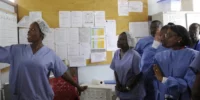
Fortalecer los programas sanitarios comunitarios de África
En 2017, los jefes de Estado de la Unión Africana prometieron desplegar dos millones de trabajadores sanitarios comunitarios (CHW por su sigla en inglés), conscientes de la importancia de su tarea a la hora de promover la salud para todos. Ya transcurrieron siete años y, en tanto los líderes africanos se aprontan para reunirse en Addis Ababa, debemos reflexionar sobre nuestro progreso. Para 2030, África enfrentará una escasez de seis millones de trabajadores de la salud, lo que hace que los CHW sean un componente clave y una solución rápida para cubrir las necesidades sanitarias del continente. Desarrollar programas de trabajadores sanitarios comunitarios resilientes en toda África nunca ha sido más urgente.… Seguir leyendo »


